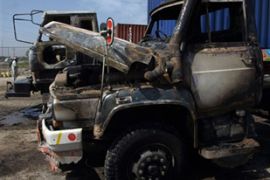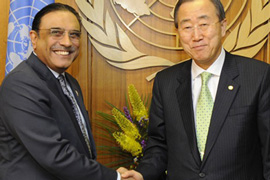Taliban warns Pakistani politicians
Elected Swat officials given ultimatum to denounce offensive or face consequences.

“They [the Taliban] can make these threats and people will take them very seriously,” Khan said.
Up to 15,000 Pakistani troops are engaged in the fight against about 4,000 Taliban-linked fighters in the Swat valley and surrounding areas of the North Western Frontier Province (NWFP).
Hundreds of thousands of civilians have fled from their homes in the northwest in an attempt to escape the clashes.
Depot attack
Wednesday’s attack on the Nato depot destroyed two lorries containing food bound for Afghanistan under a trade pact between Islamabad and Kabul, as well as six empty vehicles.
| In depth |
|
|
Mohammad Ehsanullah, a police officer, said: “Around 40 to 50 armed militants attacked the depot before dawn… They lobbed several petrol bombs and fled.”
The attackers had already disappeared by the time police arrived at the scene. It took firefighters two hours to bring the fire under control.
None of the containers holding Nato supplies and stored at the terminal were damaged, Ghafoor Khan Afridi, a police official, said.
Taliban fighters have on several occasions attacked vehicles carrying supplies for US and Nato-led troops in Afghanistan.
Most of the supplies are usually shipped through Khyber, northwest Pakistan’s tribal region.
Hamid Karzai, the Afghan president, on Wednesday warned that the threat the fighters pose to both Afghanistan and Pakistan was very real.
“Terrorists and extremists are extending their reach in whole areas of our countries,” Karzai told a regional economic conference in the Pakistani capital, Islamabad.
Nato and US commanders have been looking for alternative supply routes in Pakistan recently, although they say that the attacks on supply convoys have not threatened their operations in Afghanistan.
Aid appeal
The displacement of thousands of people due to the conflict in Swat has resulted in a grave humanitarian crisis.
On Tuesday, Asif Ali Zardari, Pakistan’s president, met Barack Obama, the US president, and Ban Ki-moon, the UN secretary-general, and appealed for help from the international community.
 |
| Zardari, left, met Ban Ki-moon, asking for aid for the displaced in Pakistan [AFP] |
“We’re appealing to the world, myself and the secretary general … to draw attention on the human catastrophe that is taking place,” he told reporters after talks with Ban in New York.
“They’re losing their earnings, their livelihood and their homes, so we want the world to help us.”
John Holmes, the UN humanitarian chief, pledged to “substantially” increase an aid appeal for Pakistan – previously set for $165.9m in 2008-2009.
The UN refugee agency has said that more than 500,000 people have been registered as displaced since May 2.
They join another 500,000 who fled fighting in the NWFP before the latest military offensive began.
The UN’s World Food Programme (WFP) has said it was doubling its shipments of emergency food to the newly displaced.
The UN Central Emergency Response Fund (CERF) also announced that more than $8m will be sent to Pakistan to provide families affected by the fighting with basic necessities.
Obama’s administration has also called for more aid to be sent to Pakistan, saying that to abandon the country would put US national interests at risk.
Richard Holbrooke, Obama’s special envoy for Pakistan and Afghanistan, said that a $7.5bn aid bill sponsored by senators John Kerry and Richard Lugar, must not be delayed.
“The only beneficiaries of a delay in this bill are the enemies of this nation,” Holbrooke said.

